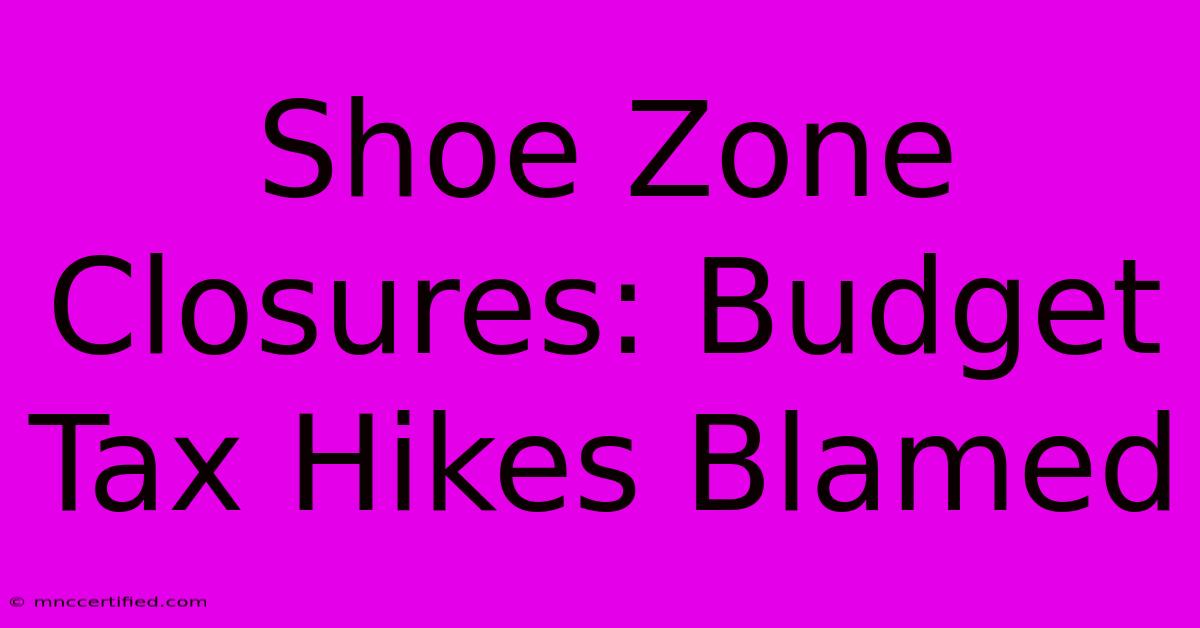Shoe Zone Closures: Budget Tax Hikes Blamed

Table of Contents
Shoe Zone Closures: Budget Tax Hikes Blamed
The popular budget footwear retailer, Shoe Zone, has announced a series of store closures, blaming the government's recent budget tax hikes as a contributing factor. This news has sent shockwaves through the retail sector and sparked a wider debate about the impact of government policy on high-street businesses. Let's delve deeper into the reasons behind these closures and explore the broader implications.
The Impact of Budget Tax Hikes
Shoe Zone, known for its affordable footwear, has cited increased corporation tax and national insurance contributions as significant burdens. These tax hikes, implemented as part of the government's recent budget, have squeezed profit margins across many businesses, but particularly those operating on tight margins like Shoe Zone. The increased costs are not easily passed on to consumers, given the retailer's focus on budget-friendly prices. This creates a difficult situation where increased operational costs directly impact profitability without the ability to offset them through price increases.
More Than Just Taxes: A Perfect Storm
While the budget tax hikes are a significant factor, it's important to acknowledge that Shoe Zone's closures are not solely attributable to them. Several other factors are contributing to this challenging situation:
- Increased energy costs: Soaring energy prices are affecting businesses across all sectors, adding another layer of cost pressure on already strained margins. Heating and lighting stores contribute significantly to overhead expenses, especially for brick-and-mortar retailers.
- Supply chain disruptions: The lingering effects of the pandemic and global geopolitical instability continue to disrupt supply chains, leading to increased costs and delays in receiving stock. This affects inventory management and can impact sales.
- Changing consumer spending habits: Shifting consumer behaviour, with a greater emphasis on online shopping, also plays a role. While Shoe Zone has an online presence, its core business remains rooted in physical stores, making it vulnerable to the decline of foot traffic on high streets.
- Competition from online retailers: The rise of online footwear retailers offering competitive pricing and convenient home delivery presents a significant challenge to brick-and-mortar stores like Shoe Zone.
The Future of Shoe Zone and Similar Retailers
The closures announced by Shoe Zone serve as a warning sign for other budget retailers facing similar pressures. The combination of increased taxation, rising operational costs, and shifting consumer habits creates a challenging environment for businesses operating on slim margins. Survival will depend on adapting to changing market conditions and exploring innovative strategies.
Potential Strategies for Survival
To navigate these difficulties, retailers like Shoe Zone need to consider several strategic options:
- Streamlining operations: Identifying areas for cost reduction and improving operational efficiency will be crucial. This could involve renegotiating supplier contracts, optimizing logistics, and streamlining staffing.
- Embracing omnichannel strategies: Developing a robust online presence and integrating online and offline channels will be essential to reach a wider customer base and improve sales. Investing in e-commerce and digital marketing is a necessary step.
- Diversification of product offerings: Exploring opportunities to diversify product lines and cater to evolving consumer demands can help reduce reliance on a single product category. Offering complementary products could attract a wider customer base.
- Strengthening customer loyalty programs: Building strong relationships with loyal customers can ensure a stable customer base and help navigate economic downturns. Incentivizing repeat purchases is a key strategy.
Conclusion: A Call for Government Support?
Shoe Zone's closures highlight the challenges faced by budget retailers in the current economic climate. While the government's tax hikes are a contributing factor, it's a complex situation with multiple contributing elements. The question remains whether the government should provide further support to struggling high street businesses or if the onus is solely on retailers to adapt and innovate. The ongoing debate about the role of government in supporting small businesses will undoubtedly continue in the wake of these closures. The future of Shoe Zone and similar retailers hinges on their ability to adapt, innovate, and perhaps, secure some form of support to weather this economic storm.

Thank you for visiting our website wich cover about Shoe Zone Closures: Budget Tax Hikes Blamed. We hope the information provided has been useful to you. Feel free to contact us if you have any questions or need further assistance. See you next time and dont miss to bookmark.
Featured Posts
-
Jan 6th Republicans On Cheney
Dec 19, 2024
-
Lillard Signs Lifetime Adidas Deal
Dec 19, 2024
-
Vick Norfolk States Head Coach
Dec 19, 2024
-
Vick To Coach Norfolk State Spartans
Dec 19, 2024
-
Trinity Rodman On Family Issues
Dec 19, 2024